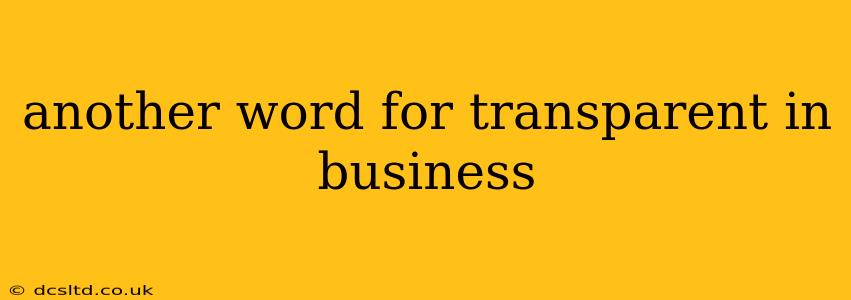Another Word for Transparent in Business: Unlocking Open Communication and Trust
In today's business landscape, transparency is paramount. It fosters trust, builds strong relationships with stakeholders, and ultimately contributes to a healthier bottom line. But sometimes, you need a word that offers a slightly different nuance or avoids overusing "transparent." This article explores alternative words for transparent in a business context, examining their subtle differences and when best to use them.
What does "transparent" mean in business?
Before diving into synonyms, let's establish a clear understanding. In business, transparency refers to open and honest communication. It means being clear about processes, decisions, and information, leaving little room for speculation or mistrust. This includes being upfront about challenges, successes, and everything in between.
What are some other words for transparent in business?
Several words effectively convey the meaning of transparency while offering a slightly different emphasis:
-
Open: This is perhaps the closest synonym. "Open" emphasizes accessibility and a welcoming attitude toward communication and information sharing. For example, "We maintain an open dialogue with our suppliers."
-
Honest: This highlights the truthfulness and integrity behind communication. "We are honest about our company's financial performance."
-
Forthright: This suggests directness and frankness, even when dealing with difficult topics. "The CEO was forthright in addressing the recent data breach."
-
Accountable: This emphasizes responsibility and taking ownership of actions and decisions. "We are accountable for our environmental impact."
-
Candid: This implies honesty and openness, even if it means revealing potentially unfavorable information. "The team provided candid feedback on the new product design."
-
Frank: Similar to candid, "frank" suggests blunt honesty, often used in situations requiring direct and unvarnished communication. "The manager gave frank assessments of each employee's performance."
-
Above board: This idiom implies ethical and legal conduct, free from any hint of secrecy or deception. "Our business practices are completely above board."
-
Unreserved: This suggests a complete lack of hesitation in sharing information. "We offer unreserved access to our performance metrics."
What are the best words to use instead of "transparent" depending on the context?
The best alternative to "transparent" depends heavily on the specific context:
- When emphasizing accessibility of information: Use open or unreserved.
- When highlighting ethical and legal conduct: Use above board.
- When focusing on honesty and truthfulness: Use honest, candid, or frank.
- When emphasizing responsibility and ownership: Use accountable.
- When stressing direct and clear communication: Use forthright.
How can I improve transparency in my business?
Improving transparency is an ongoing process requiring conscious effort. Here are a few key steps:
- Establish clear communication channels: Ensure everyone has access to necessary information.
- Promote open dialogue: Encourage employees and stakeholders to share their thoughts and concerns.
- Be proactive in sharing information: Don't wait for questions; proactively communicate updates and progress.
- Foster a culture of trust: Create an environment where honesty and open communication are valued.
- Regularly seek feedback: Actively solicit input to identify areas for improvement.
By incorporating these strategies and utilizing the alternative words discussed above, you can cultivate a business culture that prizes open communication and builds lasting trust. Choosing the right word can significantly enhance the impact of your message, strengthening your business relationships and fostering a more collaborative and successful environment.
